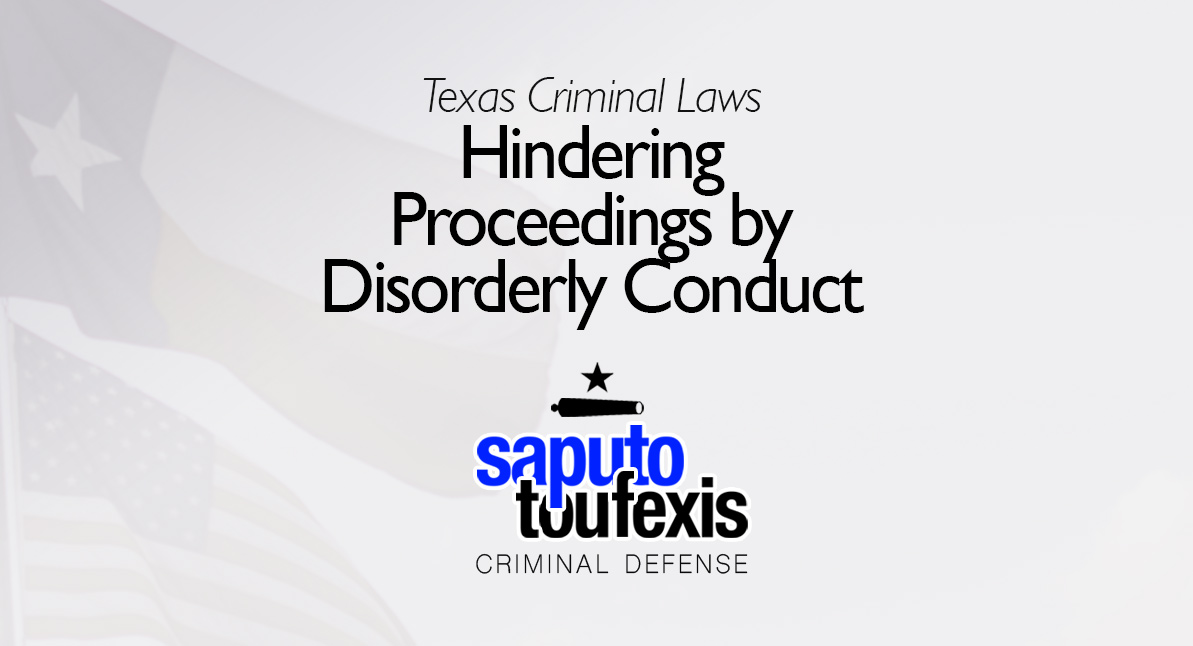The Texas Hindering Proceedings by Disorderly Conduct law gives police the right to arrest you if they believe you intentionally hindered an official proceeding by making noise, acting violently, or making a disturbance, or if you didn’t do so intentionally, you continued to do so after an explicit official request to desist.
FAQs about the
Hindering Proceedings by Disorderly Conduct law in Texas
- What is the current Texas law about Hindering Proceedings by Disorderly Conduct?
- How can I be charged with a Hindering Proceedings by Disorderly Conduct offense in Texas?
- What is the statute of limitation for Hindering Proceedings by Disorderly Conduct in Texas?
- What is the penalty for a Texas Hindering Proceedings by Disorderly Conduct offense?
- Can you get probation for Hindering Proceedings by Disorderly Conduct in Texas?
- What level of crime is Hindering Proceedings by Disorderly Conduct in Texas?
The Texas legislature codified this criminal offense in Texas Penal Code Section 38.13. The legislature did not update this law in 2023. In fact, this law has not been amended since 1993.
The Penal Code classifies the Texas Hindering Proceedings by Disorderly Conduct law under Title 8 “Offenses Against Public Administration,” Chapter 38 “Obstructing Governmental Operation.” Learn more about the Texas offense of Hindering Proceedings by Disorderly Conduct below.
What is the current Texas law about Hindering Proceedings by Disorderly Conduct?
Texas law currently defines the offense of Hindering Proceedings by Disorderly Conduct in Penal Code Section §38.13 as follows:[1]
(a) A person commits an offense if he intentionally hinders an official proceeding by noise or violent or tumultuous behavior or disturbance.
(b) A person commits an offense if he recklessly hinders an official proceeding by noise or violent or tumultuous behavior or disturbance and continues after explicit official request to desist.
How can I be charged with a Hindering Proceedings by Disorderly Conduct offense in Texas?
You can be charged with Hindering Proceedings by Disorderly Conduct in Texas if the state’s attorneys believe that each of the elements of 38.13(a)(b) as described in the section above have been met.
What is the statute of limitation for Hindering Proceedings by Disorderly Conduct in Texas?
As a misdemeanor, Hindering Proceedings by Disorderly Conduct charges have a two-year limitations period.[2]
What is the penalty for a Texas Hindering Proceedings by Disorderly Conduct offense?
A conviction for Hindering Proceedings by Disorderly Conduct in Texas is punished as a Class A misdemeanor,[3] with a maximum possible fine under Texas state law of up to $4,000 and jail time of up to one year.
Can you get probation for Hindering Proceedings by Disorderly Conduct in Texas?
The Texas Code of Criminal Procedure allows both judges and juries to grant probation for Hindering Proceedings by Disorderly Conduct, and judges are also allowed to accept deferred adjudication plea deals.[4]
Note, however, that judges may not grant community supervision after a conviction if (1) the defendant used or exhibited a deadly weapon during the commission of the felony or immediate flight thereafter and (2) the defendant used or exhibited the deadly weapon himself or was a party to the offense and knew that a deadly weapon would be used or exhibited.[5]
What level of crime is Hindering Proceedings by Disorderly Conduct in Texas?
The Penal Code classifies Hindering Proceedings by Disorderly Conduct as a Class A misdemeanor.
Learn more about the penalty range for this offense in the section above.
Legal References:
^1. Texas Penal Code §38.13. This law is current as of 2024.^2. See Code of Criminal Procedure 12.02(a)^3. Texas Penal Code §38.13(c)^4. See Chapter 42, Texas Code of Criminal Procedure, Art. 42A.054, Art. 42A.056, Art. 42A.102^5. Art. 42A.054(b), Texas Code of Criminal Procedure








